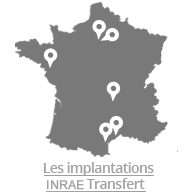
Order a technology service

INRAE Transfert Environnement

The INRAE Transfert Environment business unit is backed by the INRAE laboratories and strives to support and assist economic actors to drive technological development and innovation.
-
INRA Transfert Environnement objectives Open or Close
INRA Transfert Environment works on the following topics:
- Tackling pollution, treating water and managing waste
- Agro-bioprocesses
- Biomass/bioenergy
- Agri-environment
INRA Transfert Environment devotes a large portion of its operations to the direct implementation of services and resources for applicants. To this end the business unit performs:
- Analysis services:
- Environmental, physical, chemical and biochemical analyses (solid, liquid or gaseous matrices; cultivated soil; and contaminated soil) and measurements of biodegradability and biological activity (anaerobic digestion potential, AT4 respiratory activity, refractory chemical oxygen demand etc.)
- Microbiological and molecular analyses (measurements of microbial biodiversity, microbiological quality of soil, high-throughput sequencing, quantitative PCR etc.)
- Experimental services:
- Definition and execution of customised experimental protocols
- Pilot-scale tests:biological and/or physico-chemical processes
- Microbiological studies: identification and monitoring of micro-organisms in their environment using molecular techniques
- Appraisal services, start-up assistance, monitoring and optimisation of industrial clean-up installations (anaerobic digestion unit, sewage plant etc.). INRA Transfert Environment also offers training, education and support services to businesses
- Organisation of training sessions, theme days, symposiums and conferences
- Assistance with integrating new technologies into the company
- Technology intelligence and bibliographic summaries
- Support with collaborative R&D projects or industrial projects (definition of objectives, specifications, identification of partners, monitoring and project management).
As a resource and transfer centre, the business unit is part of the Carnot 3BCar Institute (bioenergy, biomolecules and biomaterials for renewable carbon). INRA Transfert Environment is recognised as a Research Institution by the French Ministry of Higher Education and Research, and is accredited under the Research Tax Credit.The terms of this incentive enable companies that hire the services of organisations such as INRA Transfert to qualify for Research Tax Credit eligibility equal to 200% of the amount of the outsourced research and development.
Learn more about INRA Transfert Environnement
Toulouse White Biotechnology

The mission of Toulouse White Biotechnology (TWB) is to contribute to the development of a bio-economy based on the use of renewable carbon as a raw material to fuel industry in the future while respecting existing food and feed chains.
-
TWB objectives Open or Close
TWB has a two-pronged approach:
- Facilitate the public research/industry interface in the field of white biotechnology; and
- Promote the development of new approaches in sustainable production by using innovative biological tools (enzymes, micro-organisms) and competitive processes.
The target areas of application are the production of intermediate products for the chemicals industry, biomaterials, biopolymers and biofuels.
TWB covers a wide range of research and industrial development activities, from biological engineering (enzymatic and metabolic engineering, synthetic biology) to the development of processes on the pre-industrial pilot scale.TWB carries out its projects with creativity using ethical approaches and applying the principles of sustainable development.
TWB leverages synergies with the Processes and Biological Systems Engineering Laboratories (LISBP) at the Toulouse INSA (INRA joint research unit 792, CNRS joint research unit 5504). There are also active collaborations with other public laboratories, such as that with the Genopole biocluster in Evry.
Different types of collaborative projects in research and development are offered:
- So-called 'pre-competitive' projects are conducted ahead of applied research and generate industrial property (IP) for the public domain.
- So-called 'competitive' projects are funded by TWB partners or third parties into more applied research themes that lead to opportunities in the short or medium term, for which the IP generated remains the property of the manufacturer.
Technical platforms featuring high-tech equipment are made available to researchers and technical staff as part of the research projects. Services are also provided via these platforms.
TWB, which was selected for the Investments in the Future programme in March 2011, is backed by a joint service unit overseen by the trio of INRA, INSA and CNRS (INRA joint service unit 1337;CNRS joint service unit 3582). Certified by the Carnot 3BCAR Institute, the joint service unit is managed by INRA, which coordinates the operations of the entity's executive bureau through its subsidiary INRA Transfert.
The executive bureau is responsible for the day-to-day operation of TWB under the authority of the Consortium's Strategic Advisory Committee. This public-private consortium brings together some 30 public and private partners who share common socio-economic goals and work together to steer and accelerate TWB projects.Contact information :
Coordinator: Pierre Monsan : pierre.monsan@insa-toulouse.fr
Project manager : Olivier Galy : ogaly@insa-toulouse.fr
Business Management : Michel Manach : mmanach@insa-toulouse.frLearn more about TWB




